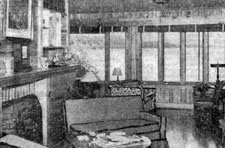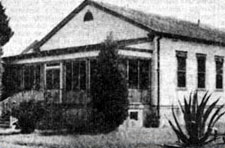College’s Marine Lab Program Opens at Ft. Johnson as Director Arrives
 Meet The Director Of Ft. Johnson Marine Biological Lab And Family, Dr. And Mrs. Joseph Robert Merkel And Their Son Glenn, Age 4 1/2
Meet The Director Of Ft. Johnson Marine Biological Lab And Family, Dr. And Mrs. Joseph Robert Merkel And Their Son Glenn, Age 4 1/2
By Bernard L. Poole, News and Courier Staff Writer, News and Courier, August 9, 1955
With the arrival of Dr. Joseph Robert Merkel, director, the teaching-research program of the College of Charleston Marine Biological Laboratory at Ft. Johnson has gotten under way.
Dr. Merkel and his family plan to utilize temporary living quarters in the renovated lazaretto at the fort until permanent quarters are available. His scientific mind entertains nothing more than a humorous reaction to the idea of occupying the former shelter for lepers. This building is being transformed into one of the most attractive dwellings in the immediate area.

Here’s Interior Picture of Guest House At Ft. Johnson. Marine Laboratory Visiting Scientists Will Occupy This Completely Renovated Building
Dr. Merkel, a native of Alburtis, Pa., completed his undergraduate work at Moravian College where he majored in physical chemistry. He received an MS degree from Purdue University in the same field. His PhD Degree was awarded by the University of Maryland where Dr. Merkel majored in bacteriology with biochemistry as his minor field of interest.
He was awarded a Waksman-Merck post-doctoral fellowship in 1952. He worked in the Department of Microbiology at Rutgers University, specializing in the study of cellular division.
In 1953, Dr. Merkel was the recipient of a Lalor Foundation Fellowship. During this period his research was carried on at the Marine Biological Laboratory, Woods Hole, Mass.
Since leaving Woods Hole, Dr. Merkel has been research associate and instructor of microbiology at the Institute of Microbiology, New Brunswick, N.J. The institute was built by funds from royalties from streptomycin accruing to its discoverer, Dr. S. A. Waksman.
Dr. Merkel’s principal interest was transferred from chemistry to marine biology when he realized the tremendous, significance of the latter science. The ocean possesses limitless sources of food. Marine biology is concerned with the study of the life and food cycles and the migratory habits of marine organisms. Dr. Merkel’s specialty is the study of the role of the microorganisms of the sea.

This Is The Lab Building, Where College’s Program Centers Teaching and Research are Dual Purposes Of College’s Project
Current plans at the laboratory at Ft. Johnson involve two phases, teaching and research. Emphasis will be on the microbiology of the sea. This will not be to the exclusion of other phases of biology, however, because of the close relationship of microorganisms with larger marine forms.
The first marine biology class will begin at the College of Charleston in September. Dr. Merkel plans to conduct classes at the college until proper facilities are available at Ft. Johnson. Meanwhile, laboratory and field work in conjunction with the marine biology class will be carried but at the fort.
Dr. Merkel hopes to have available necessary equipment for carrying on the teaching program at the fort in the near future. He is particularly interested in providing the means of receiving visiting research men from various parts of the United States and abroad who plan to study at the laboratory. He has already received inquiries from investigators in various parts of the world.
Dr. Merkel said that he expects to be joined at the fort next summer by a research expert from Rutgers University whose specialty is study of the problems of pollution of harbors. He is desirous of bringing about the cooperation of the laboratory at Ft. Johnson with various colleges and universities in the South Carolina area. The College of Charleston facilities will thus be used as a center of the study of marine biology for a number of institutions where proper equipment is not available.
Dr. Merkel’s favorite hobby is closely associated with is work. He is an ardent fisherman. Mrs. Merkel, also a native of Alburtis, Pa., spends much of her spare time embroidering needlepoint. Both are intensely interested in sports. Their son, Glenn, four and one-half years old is, like his dad, a devoted angler.
Ft. Johnson, located on the northeast point of James Island, was built in 1704 and named for Gov. Nathaniel Johnson. A second fort of Tapia was built on the same site in 1759. During the controversy over the Stamp Act in 1765, the stamped paper sent to Charleston from England was stored in the fort and never used.
In 1775, the colonists seized Ft. Johnson and it was at this site that the first American flag was displayed in South Carolina. It consisted of a blue field with a white crescent in the dexter corner. In 1793, a third fort was built by Gov. William Moultrie but it was abandoned in 1800 after serious damage was incurred during a violent storm. With the threat of war with England in 1812, Ft. Johnson was repaired and garrisoned. However, it was nearly totally destroyed by a raging gale in the following year.
A mortar shell fired from Ft. Johnson was the signal for the bombardment of Ft. Sumter April 12, 1861. The fort on James Island was evacuated in 1865 and the military works were allowed to decay. It had been used however as a quarantine station since 1898. In this capacity, the fort was maintained by the State of South Carolina until 1906 when it was turned over to the U.S. government.






